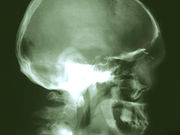Nonsignificant increase in laryngeal preservation, laryngectomy-free survival with cetuximab plus RT
WEDNESDAY, July 13, 2016 (HealthDay News) — For patients with hypopharyngeal or laryngeal carcinoma, the addition of cetuximab to radiotherapy is associated with a nonsignificant improvement in laryngeal preservation and laryngectomy-free survival, according to a study published online July 7 in JAMA Otolaryngology-Head & Neck Surgery.
James Bonner, M.D., from the University of Alabama at Birmingham, and colleagues examined the rates of laryngeal preservation and laryngectomy-free survival in a randomized trial involving patients with cancer of the larynx or hypopharynx. A total of 168 patients from 73 centers in the United States and 14 other countries were randomized to cetuximab and radiotherapy (CRT; 90 patients) or radiotherapy alone (78 patients).
The researchers found the rates of laryngeal preservation were 87.9 and 85.7 percent for CRT and radiotherapy alone, respectively, at two years (hazard ratio, 0.57; 95 percent confidence interval, 0.23 to 1.42). For laryngectomy-free survival, the hazard ratio was 0.78 (95 percent confidence interval, 0.54 to 1.11). Median overall survival was 27 months in the CRT group and 21 months in the radiotherapy-alone group (hazard ratio, 0.87; 95 percent confidence interval, 0.60 to 1.27). There were no between-group differences noted in overall quality of life, need for a feeding tube, or speech.
“The results of a possible cetuximab-related laryngeal preservation benefit for patients with hypopharyngeal or laryngeal cancer are intriguing; these results need to be interpreted in the context of a retrospective subset analysis with limited sample size,” the authors write.
Several authors disclosed financial ties to pharmaceutical companies, including Eli Lilly, which manufactures cetuximab and partially funded the study.
Copyright © 2016 HealthDay. All rights reserved.








